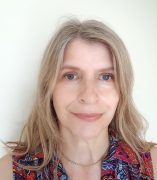
Izolda Wolski-Moskoff, PhD
Visiting Lecturer and Director of Language Programs - Polish and Russian
Polish, Russian, and Lithuanian Studies
Pronouns: She/Her/Hers
Contact
Building & Room:
1628 UH
Address:
601 S. Morgan St.
Office Phone:
Email:
About
Izolda Wolski-Moskoff is a visiting lecturer in Polish and Basic Language Program coordinator. She holds a PhD in Slavic linguistics with a specialization in Second Language Acquisition. Dr. Wolski-Moskoff’s research is focused on the Polish heritage language in the United States. In her dissertation on case in heritage Polish, she studied the language of college-age Polish heritage speakers, gaining invaluable and unique insights into the language skills of a population that still makes up a considerable portion of Polish enrollments in the US. Part of her research was published in the book Dwujęzyczni i dwukulturowi. Bilingual and Bicultural. Speaking Polish in North America (2017), aimed at serving the Polish community by promoting bilingualism among parents of heritage speakers.
Professional Leadership
President, North American Association of Teachers of Polish
Selected Presentations
- “The role of parental input in shaping the knowledge of case in Polish Heritage Speakers”. Presented at Twelfth Heritage Language Research Institute, Penn State University, online conference, June 2020
- "Teaching Polish as a distance-hybrid course". Presented at American Association of Teachers Of Slavic and East European Languages Annual Conference, Washington, DC, February 2018
- "Polish dialects in Chicago - diglossia preserved". Presented at Annual Workshop on Immigrant Languages in the Americas, Copenhagen, Denmark, October 2017
Research Currently in Progress
The Polish Immigrant Community of Cleveland, Ohio. In: Historical Sociolinguistic Studies of Language Islands in the Americas: Tracing the Development from Immigrant Languages to Postvernacularity (Brill, 2022)